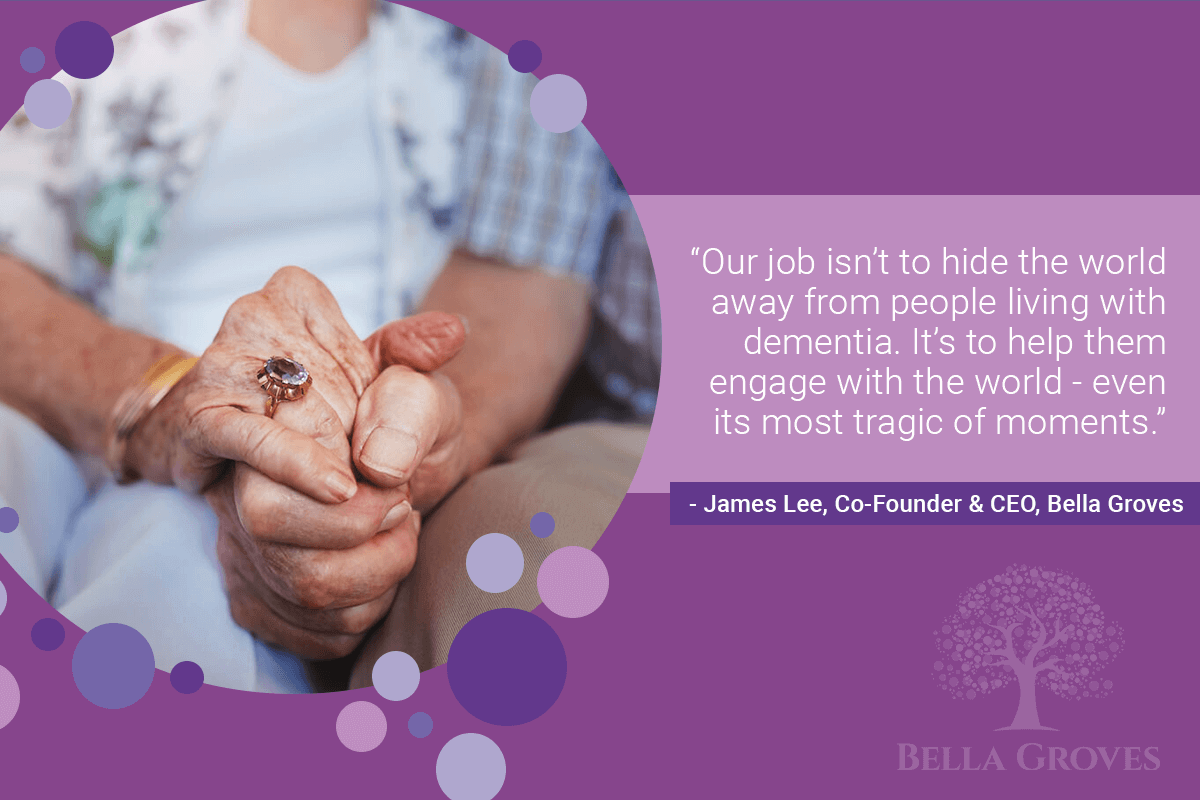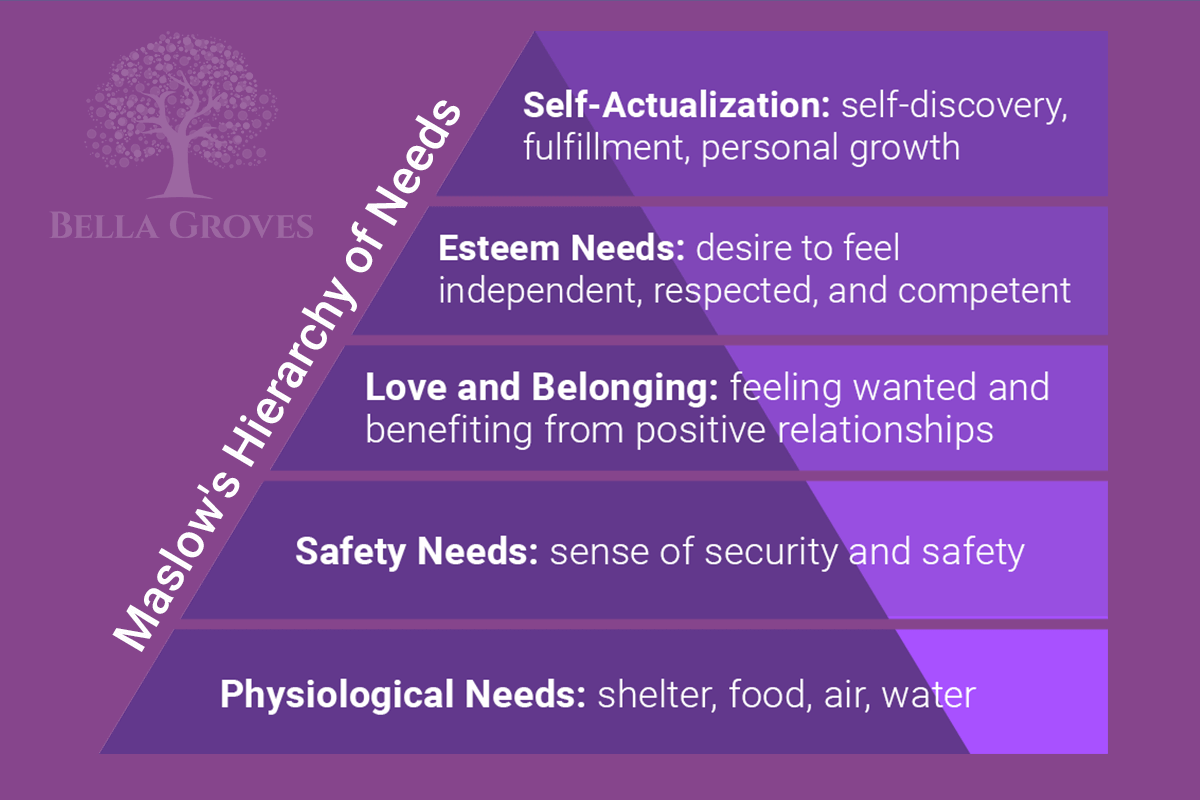
How to Discuss a Major Life Event with a Person Living with Dementia
For some reason, people have an instinctual response to lie to a person living with dementia. People don’t want to upset a person with dementia, confuse them, or, in some cases, simply take the time to discuss difficult topics with them, so they instead tell little white lies or “therapeutic lies.”
Too often, people focus on dementia, not the person. People with dementia are parents, grandparents, friends, teachers, scholars, business people, and everything in between. A dementia diagnosis doesn’t take away from their want and need to learn and be involved.
Whether it’s global news or personal life events, it can seem easier to avoid a topic, particularly if it is traumatic or emotional. However, this is not always the best approach.
Bella Groves’ Co-Founder and CEO, James Lee, shares:
“As the owner of a dementia care business, I walked into our community the morning after [the events in Uvalde, Texas] and spoke with a resident – a retired elementary school teacher of nearly four decades.
At times, she doesn’t have the short-term memory to recall a conversation we had a few minutes ago. But on this morning, she remembered seeing the news footage the prior day about what happened in Uvalde. It sat with her.
Our instinct was to shield her from this, but we recognized that that wasn’t our call to make. Our job isn’t to hide the world away from people living with dementia. It’s to help them engage with the world – even its most tragic of moments.
In a way, she helped me to feel my way through the start of my own emotions. Listening to her recount her fears of these things potentially happening to her or when she first heard about a school shooting at all… there’s something resonant about this mix of circumstances that had our resident of a memory care community counseling my emotions through her lens.”
Recognize Their Need for Engagement
In dementia care, many associate the word “engagement” with activities and mental stimulation. But engagement goes beyond puzzles and crafts. A person with dementia needs to stay engaged in their life, their family, and their community.
By avoiding topics or withholding information you think are “too difficult” to share, you disconnect a person living with dementia from the world around them. For example, one challenging discussion to have with a person living with dementia is the death of a family member or loved one.
The Alzheimer’s Society shares, “It can be hard to know how much detail to give, especially if finding out how the person died could be distressing. There are a few things to consider, such as the person’s situation and their relationship to the person who died. If they are not told about the death, it may mean they don’t have a chance to grieve. It may also leave them feeling confused and unsupported. For example, they may be aware that the person who has died has stopped visiting them, without knowing why.”
Just like any other member of your family, a loved one with dementia deserves to know about the events that impact their life and have the chance to grieve and express their feelings.
Provide Reassurance, Not Redirection
A common practice in dementia care is redirecting a person living with dementia when a conversation or activity is causing stress or frustration. Adjusting the conversation can be helpful, but it shouldn’t be done abruptly or by simply ignoring their question.
Here is a conversation James Lee had with a Bella Groves resident:
Bella Groves Resident: “How did I get here? Why am I here?”
James: “Mary [not real name], I’d be happy to talk through this with you. Would you feel okay chatting in your room?” This gets her to a safe and familiar environment where she feels comfortable.
James: [Pointing to her photos in her room] “Oh, what beautiful grandchildren you have!”
Bella Groves Resident: “They are the best! I’m so blessed.”
This helps to anchor her emotions in something positive and heartfelt, and puts her in control.
James: “What did you want to talk to me about?”
Mary didn’t remember.
James: “Well, Mary, you were wondering how you got here.”
Bella Groves Resident: “Oh yes. That’s right. So how did I get here?”
Don’t be afraid to address the issue. You haven’t redirected her attention if you move away from what’s on her mind. If anything, it builds trust to face the issue head-on.
James: “You moved in with us because you just wanted a little bit of help from time to time.”
Bella Groves Resident: “Oh, because of my memory, isn’t it?”
Now she’s in control of the conversation.
James: “Yes, that’s right. You’re safe here, and we love being a part of your life.”
Bella Groves Resident: “Yeah, I do need help sometimes. My mind doesn’t always feel right.”
James: “I’m sure that’s frustrating. Mary, I know you’d rather be home, but I’m also glad you’re here, and we can help you feel safe and comfortable.”
Reassurance is better than redirection. Using first names helps reaffirm a personal relationship.
James: “Did you want to talk more about this? Or, I think you mentioned wanting to wash your hair today. Can I help you gather some things for the salon?”
Now she can choose to move on from the topic.
Dementia care is not about tricking someone or “redirecting” what is causing their anxiety and confusion. Great care is about understanding what unmet needs they have when they’re feeling anxious. In most cases, it is simply taking the time to show them that they’re worthy of honesty, patience, and kindness.
Talking with a person with dementia about a significant life event or a global tragedy can be challenging, but it is up to us to keep them engaged in the world around them.
We created Bella Groves so that wherever you and your family are in your journey with dementia – start, middle, or end – you have someone to turn to. If you have questions about your dementia care journey, we invite you to call us at (830) 323-0440 or email us at hello@bellagroves.com.


